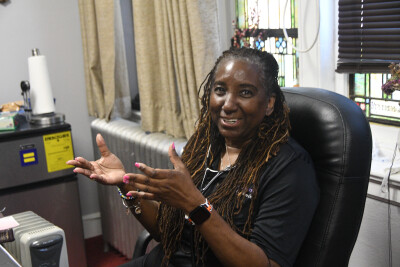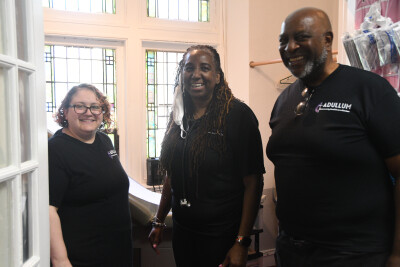Adullum Healthcare creates trajectory of hope
By Melissa Lauber
 Irance Reddix-McCray is equally at home with a cross or a stethoscope. In fact, as a doctor and an ordained United Methodist pastor, she has discovered that faith and medicine often work best when intertwined.
Irance Reddix-McCray is equally at home with a cross or a stethoscope. In fact, as a doctor and an ordained United Methodist pastor, she has discovered that faith and medicine often work best when intertwined.
Health care is “not an absence of disease,” the Rev. Dr. Reddix-McCray said. “It’s a wholeness, a shalom that allows you to live well and be well in community.”
Certain in this belief, and with 31 years of experience as a family practice physician, she began Adullum Community Healthcare Center. The first version of Adullum started in 2015 at St. John’s UMC in Baltimore. Most recently, it has been recreated at New Waverly UMC in Baltimore, where Reddix-McCray’s vision is transforming the community.
Believing that health care is a human right, Adullum, a 501c3 nonprofit agency, offers access to medical care to the underserved. Using a holistic healthcare model, Adullum provides primary and behavioral healthcare as well as life skills and counseling. They take most insurance and work in partnership with the Central Area Health Education Consortium, Healthcare for All, Planned Parenthood, and several smaller organizations.
In a typical week, they provide physicals, immunizations, counseling, and primary health care services. They do community health fairs that offer blood pressure checks, blood glucose checks, sometimes HIV and hepatitis screening, and various health education tools. They also provide various seminars, including Narcan training and basic health education. Where there is need, Adullum responds
While it is a work in progress, Adullum’s success attracted the attention of the Rev. Fred Smith, a former professor at Wesley Seminary and a nationally recognized expert in community health, who is moving back to the area to work with this ministry.
“The church’s numbers may be shrinking, but the church is not going to die,” Smith said. “This is a time for revival. … The church needs to find a new purpose. It’s gotten big, fat and lazy. But the church is about to have another great awakening. … The healing and wholeness of the community could be our new purpose. God is not concerned about how many people are in the pews, but rather, lifting up God’s name up in a way that brings light to the darkness.”
 Adullum treats just about everything related to health care differently, making sure everything is grounded in principles of love and dignity. Appointments usually take 40 minutes to an hour, as Reddix-McCray spends time in conversation with patients about their quality of life in addition to addressing symptoms. Jessie Miller, Addulum’s nurse practitioner, does home health care visits because she wants to make sure personalized health care is available to all. She also offers her expertise in working with issues of neuro-divergence and trans health care, two specialized areas of care that are rare in some low-income areas.
Adullum treats just about everything related to health care differently, making sure everything is grounded in principles of love and dignity. Appointments usually take 40 minutes to an hour, as Reddix-McCray spends time in conversation with patients about their quality of life in addition to addressing symptoms. Jessie Miller, Addulum’s nurse practitioner, does home health care visits because she wants to make sure personalized health care is available to all. She also offers her expertise in working with issues of neuro-divergence and trans health care, two specialized areas of care that are rare in some low-income areas.
The congregation at New Waverly UMC also provides food to be given to any in need and operates a clothing boutique. And, Jackie Dunn, who opens the doors to the clinic when they open at 8:30 a.m., is on hand to provide hospitality and security.
Dunn is committed to helping those in the community. “I was homeless from the age of 19 to 28,” she said. She eventually got back on her feet. “I didn’t have money or resources, but I thought I could give back in some way. Sometimes people just need a hug. I lived that path, I just wanted to put a smile on someone’s face.”
All of these stories combine to create a small clinic that reaching out into the community in extraordinary ways. Word of mouth is spreading, the number of patients seen in the small examination room in the church, in home health visits, and via telehealth exams is growing.
Reddix-McCray and the Adullum community is now crafting a vision in which similar health clinics might be opened in other settings in area United Methodist churches. They are also offering their services as a teaching church to help guide congregations interested in starting community healthcare ministries.
“Churches are healing communities,” she said. “Maybe several churches could come together and share a space. Every church should be a healing station where people who feel broken can go, get what they need, and get a sense that someone loves them as Christ loves them.”
Creating and becoming these places of wholeness and shalom is at the heart of Adullum, which is named after a cave where David, in 1 Samuel 22, hid from King Saul. Others at the time, who were deeply depressed or stressed, joined him there. God empowered those men of valor, and they went on to regain the nation of Israel, Reddix-McCray explained. “When I was thinking about a name, I realized something happened in that cave that created community and healing and health. The name Adullum was born.”
From the Old Testament story through the stories being lived out today in the streets of Baltimore, Smith believes a spiritual movement is building – a movement ruled by love, justice and mercy.
“We are all, every human being, created in the image of God. We are all part of the same story, the same narrative and we get to create that story,” he said. “Love is at the center of the hermeneutic of that. … We all come with our stories. The community’s job is to share that story toward a trajectory of hope.”
Building this hope means that churches need to leave their buildings and move out into their communities. For those wondering where to start, Reddix-McCray points to the story of Moses, who had just escaped in front of the Egyptian army and was standing before the Red Sea.
He felt trapped, but God told him to use what he had. Moses replied all that he had was a staff. God commanded him to throw down the staff. The Red Sea parted.
“What do you have in your hand,” Reddix-McCray asked. What is it you do well? We need to use what we have. If you’re just going to sit there, you might as well die. What you have in your hand can be used for God’s glory.”
As part of using what is in our hands to help transform lives, the Baltimore-Washington Annual Conference is collecting supplies to support Adullum Community Healthcare Center. The drive for supplies and much-needed funds is part of the mission project of the 240th Annual Conference session, which meets May 29-31 in Baltimore.
Individuals, small groups and congregations are encouraged to visit a wish list Adullum has set up on Amazon that lists the clinics needs. See the list. The supplies will be sent to the clinic.
Those who wish to contribute cash, which will go to salaries and other needs, can make donations here.

Thank you Dr. Reddix-McCray for your tireless commitment to community health and providing support to those that need it the most and often overlooked. I love your model and challenge for all UMC churches to repurpose our spaces to provide community health. I look forward to donating and supporting your ministries.